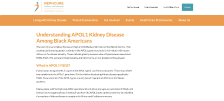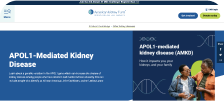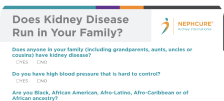Alonzo's Story
Learn more about how we can Power Forward, together.
Alonzo's story
Learn more about how we can Power Forward, together.
Alonzo's story
Learn more about how we can Power Forward, together.
Since the start of his legendary career, basketball Hall-of-Famer Alonzo Mourning has been known for his tenacity and never-give-up attitude. But at the height of his career, he was diagnosed with a rare genetic kidney disease now known as a form of APOL1-mediated kidney disease (AMKD).
Luckily, Alonzo’s physicians were able to detect warning signs through a routine physical, and they confirmed his diagnosis by conducting follow-up tests. He was fortunate to receive a kidney transplant and now lives a healthy, active lifestyle. He encourages others to be proactive about their health by learning their family history of kidney disease and seeing a doctor for regular checkups. And for those who have kidney disease, he encourages seeking further testing to understand your APOL1 genotype.
Understanding Our Opponent
What is APOL1?
Everyone has the APOL1 gene. It’s present in many tissues, including the kidneys, and it’s a part of the body’s immune system. Over the past 3,000-10,000 years, the gene evolved in specific ways in people who lived in sub-Saharan Africa to protect them from resistant forms of an infectious parasite. This evolution resulted in the emergence of “genetic variants” or “risk variants” of the APOL1 gene.
In 2010, scientists found that people with two APOL1 risk variants face increased risk of kidney disease. Today, people of sub-Saharan African ancestry may carry these APOL1 genetic variants, including people who identify as Black, African American, Afro-Caribbean, and Latino/Latina.
37 M
An estimated 37 million Americans have chronic kidney disease
35%
African Americans account for 35% of all kidney failure cases
4-5X
Americans of African ancestry are 4-5x more likely to develop kidney failure than Americans of European descent
13%
13% of African Americans have two APOL1 risk variants
Resources on APOL1 Gene and Kidney Disease
Check out these links from kidney health advocacy organizations to learn more about kidney disease, the role of APOL1 variants in kidney disease, and the signs and symptoms to look out for.

About Chronic Kidney Disease (CKD)
Learn more about CKD and what causes it from the American Kidney Fund.

Genetics and Kidney Disease
Learn from the National Kidney Foundation about why people with certain genetic variants may develop kidney disease.

Understanding APOL1 Kidney Disease Among Black Americans
Learn from NephCure about Focal Segmental Glomerulosclerosis (FSGS) in Black Americans.

APOL1 Gene and Kidney Disease
Learn more about APOL1 risk variants and discover additional genetic testing resources from the American Kidney Fund.

Does Kidney Disease Run in Your Family?
Visit this page from NephCure for more information about family history and kidney disease, genetic testing, and genetic testing resources.
Genetic Testing for APOL1 Risk Variants
If you have kidney disease and African ancestry (and/or other characteristics of APOL1-mediated kidney disease as outlined in our guide), you may be at risk for AMKD. A genetic test is the only way to know whether you have two APOL1 risk variants associated with AMKD. This process is called "genotyping" and it is conducted through a blood test, saliva collection, or cheek swab.
Vertex Pharmaceuticals is working with Arkana Laboratories, Natera, and Labcorp to sponsor no-cost genetic testing for eligible participants. You can visit their websites to learn more about each program. Genetic testing must be ordered and conducted by a healthcare provider; please speak with your doctor to understand your eligibility, the risks and benefits of genetic testing, and whether one of these testing options is right for you.
You can also learn more about genetic testing and find additional resources (including other testing options) from the patient advocacy organizations’ links provided.
About APOL1-Mediated Kidney Disease
About APOL1-Mediated Kidney Disease
AMKD is a genetic form of kidney disease. It causes damage to the kidney that causes protein to appear in the urine. It is often silent – people don't feel sick until it is advanced. It can lead to rapid kidney failure, which requires dialysis or a kidney transplant.
AMKD is a genetic form of kidney disease. It causes damage to the kidney that causes protein to appear in the urine. It is often silent – people don't feel sick until it is advanced. It can lead to rapid kidney failure, which requires dialysis or a kidney transplant.
About APOL1-Mediated Kidney Disease
AMKD is a genetic form of kidney disease. It causes damage to the kidney that causes protein to appear in the urine. It is often silent – people don't feel sick until it is advanced. It can lead to rapid kidney failure, which requires dialysis or a kidney transplant.
Gathering Your Team
Gathering Your Team
AMKD is a complex disease that many might not notice right away, which is why it is critical for those at risk to have a care team that they trust.
For financial advisor Kevin Mott , that meant meeting with multiple doctors before he was diagnosed with kidney disease in 2002 – which he later learned was a form of AMKD. As a kidney health advocate, he shares his story to demonstrate the importance of being proactive and self-advocacy when communicating with doctors.
AMKD is a complex disease that many might not notice right away, which is why it is critical for those at risk to have a care team that they trust.
For financial advisor Kevin Mott , that meant meeting with multiple doctors before he was diagnosed with kidney disease in 2002 – which he later learned was a form of AMKD. As a kidney health advocate, he shares his story to demonstrate the importance of being proactive and self-advocacy when communicating with doctors.
Gathering Your Team
AMKD is a complex disease that many might not notice right away, which is why it is critical for those at risk to have a care team that they trust.
For financial advisor Kevin Mott, that meant meeting with multiple doctors before he was diagnosed with kidney disease in 2002 – which he later learned was a form of AMKD. As a kidney health advocate, he shares his story to demonstrate the importance of being proactive and self-advocacy when communicating with doctors.
Going on the Offensive
Going on the Offensive
Like other chronic kidney diseases, AMKD can progress quickly and without obvious symptoms at first.
Powering Forward means taking action – having open conversations with your family and your doctor about your health and family history of kidney disease.
It’s important to talk to your doctor to understand if you have kidney disease, or are at risk of developing it. Check out the video to hear from Alonzo Mourning and Kevin Mott on navigating these kinds of conversations.
If you’re looking for advice for how to talk to your family and doctor about AMKD, be sure to check out The AMKD Conversations Guide.
Like other chronic kidney diseases, AMKD can progress quickly and without obvious symptoms at first.
Powering Forward means taking action – having open conversations with your family and your doctor about your health and family history of kidney disease.
It’s important to talk to your doctor to understand if you have kidney disease, or are at risk of developing it. Check out the video to hear from Alonzo Mourning and Kevin Mott on navigating these kinds of conversations.
If you’re looking for advice for how to talk to your family and doctor about AMKD, be sure to check out The AMKD Conversations Guide.
Going on the Offensive
Like other chronic kidney diseases, AMKD can progress quickly and without obvious symptoms at first.
Powering Forward means taking action – having open conversations with your family and your doctor about your health and family history of kidney disease.
It’s important to talk to your doctor to understand if you have kidney disease, or are at risk of developing it. Check out the video to hear from Alonzo Mourning and Kevin Mott on navigating these kinds of conversation.
If you’re looking for advice for how to talk to your family and doctor about AMKD, be sure to check out The AMKD Conversation Guide.
Join the Team
We’re powering forward, together. Help others in the community know the risk of APOL1-mediated kidney disease and take action for their health.
Power forward like Alonzo Mourning
Join the Team
We’re powering forward, together. Help others in the community know the risk of APOL1-mediated kidney disease and take action for their health.
Power forward like Alonzo Mourning



1. Take charge of your health: know your family history. Does anyone in your family have kidney disease?
2. See a doctor regularly: talk to them about your personal risk of kidney disease and how to stay healthy.
3. Get tested for kidney disease if you have symptoms. If you are diagnosed with kidney disease and have other characteristics of AMKD (as outlined in our guide), talk to your doctor about getting genotyped for the APOL1 risk variants.
#PowerForwardTogether
1. Take charge of your health: know your family history. Does anyone in your family have kidney disease?
2. See a doctor regularly: talk to them about your personal risk of kidney disease and how to stay healthy.
3. Get tested for kidney disease if you have symptoms. If you are diagnosed with kidney disease and have other characteristics of AMKD (as outlined in our guide), talk to your doctor about getting genotyped for the APOL1 risk variants.
#PowerForwardTogether
Join the Team
We’re powering forward, together. Help others in the community know the risk of APOL1-mediated kidney disease and take action for their health.
Power forward like Alonzo Mourning
1. Take charge of your health: know your family history. Does anyone in your family have kidney disease?
2. See a doctor regularly: talk to them about your personal risk of kidney disease and how to stay healthy.
3. Get tested for kidney disease if you have symptoms. If you are diagnosed with kidney disease and have other characteristics of AMKD (as outlined in our guide), talk to your doctor about getting genotyped for the APOL1 risk variants.
#PowerForwardTogether
I agree and understand that by submitting my email address, Vertex Pharmaceuticals Incorporated will use that information to send me news, information and volunteer opportunities through email related to the Power Forward Together campaign. All personal data will be processed in accordance with the Vertex Privacy Notice. I may unsubscribe at any time by clicking the relevant link at the bottom of the emails that I receive.








